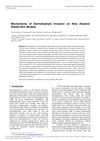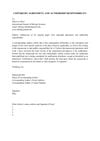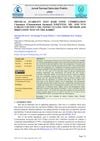 1 citations,
January 2020 in “E3S web of conferences”
1 citations,
January 2020 in “E3S web of conferences” The study found that injecting spores directly into rabbit skin effectively caused fungal skin infections, with symptoms worsening over time.
 1 citations,
January 2013 in “International Journal of Medicinal and Aromatic Plants”
1 citations,
January 2013 in “International Journal of Medicinal and Aromatic Plants” Flaxseed ingestion and oil application help rabbit hair grow.

Green tea extract helped heal rabbit skin burns better than antibiotic ointment.
January 2011 in “The Chinese Journal of Dermatovenereology” Curcuma anti-acne gel effectively reduces acne symptoms.
CDPDFM can improve acne symptoms in rabbit ears.
 47 citations,
October 1989 in “Circulation Research”
47 citations,
October 1989 in “Circulation Research” The study explains how minoxidil sulfate causes vasodilation in rabbits by opening potassium channels and inhibiting calcium channels.
 47 citations,
November 1982 in “Journal of Cardiovascular Pharmacology”
47 citations,
November 1982 in “Journal of Cardiovascular Pharmacology” Nitrendipine and nifedipine effectively block muscle contractions, while papaverine relaxes them and minoxidil needs high amounts to work.
 35 citations,
May 2019 in “Frontiers in genetics”
35 citations,
May 2019 in “Frontiers in genetics” Non-coding RNAs play key roles in the hair growth cycle of Angora rabbits.
10 citations,
January 2015 in “European journal of pharmacology” Ginsenoside Rb1 may help remodel hypertrophic scars effectively at a dose of 0.56 mg.
 9 citations,
August 2017 in “Journal of comparative pathology”
9 citations,
August 2017 in “Journal of comparative pathology” Trichoblastomas in rabbits are linked to uncontrolled embryonic hair growth and have distinct histological features.
 December 2024 in “Egyptian Poultry Science”
December 2024 in “Egyptian Poultry Science” Ivermectin 0.1% is the best and safest topical treatment for rabbit mange.
Genetic analysis of rabbits identified key genes for traits like coat color, body size, and fertility.
 December 2020 in “Jurnal Wiyata: Penelitian Sains dan Kesehatan”
December 2020 in “Jurnal Wiyata: Penelitian Sains dan Kesehatan” Aloe vera peel extract gel helps speed up the healing of minor burns in rabbits.
 July 2020 in “International journal of biology sciences”
July 2020 in “International journal of biology sciences” Coconut oil mixed with egg yolk and vitamin E may improve rabbit hair growth more than other plant oils.
 August 2019 in “Research Square (Research Square)”
August 2019 in “Research Square (Research Square)” Red LED light improves the quality of Angora rabbit wool by promoting hair growth.
January 2009 in “Journal of Zhengzhou University” LAIC cream can improve acne by making skin thinner and softer.
3 citations,
November 2021 in “Journal of biomedical materials research. Part B, Applied biomaterials” AMFIBHA scaffold significantly healed large full-thickness burn wounds in rabbits and restored skin's mechanical properties.
 3 citations,
September 1980 in “Experientia”
3 citations,
September 1980 in “Experientia” Dobutamine does not mimic dopamine at therapeutic doses but may at very high concentrations; microfilaments, not microtubules, are important for wound healing in Xenopus embryos.
2 citations,
May 2022 in “International journal of molecular sciences” Changes in KRT17 gene activity linked to wool production in Angora rabbits.
August 2018 in “Chinese journal of plastic surgery” Buccal mucosa grafts work well for urethroplasty in rabbits.
April 2023 in “Chinese Medical Journal” Human hair follicle stem cells help repair tendon injuries.
2 citations,
October 1961 in “Experimental Biology and Medicine” Natural feedstuffs help reduce muscular dystrophy in rabbits more than selenium or vitamin E alone.
 January 2021 in “International journal of pharmaceutical research”
January 2021 in “International journal of pharmaceutical research” Sansevieria trifasciata P. extracts, especially the ethyl acetate fraction, effectively promote hair growth in male rabbits with hair loss.
98 citations,
July 1968 in “Archives of Dermatology” Human sebum can cause acne by clogging pores.
1 citations,
November 1981 in “PubMed” No clear conclusion available.
 July 2023 in “Research journal of pharmacy and technology”
July 2023 in “Research journal of pharmacy and technology” The hair tonic with Capsicum frutescens extract helps hair grow in male rabbits.
 May 2023 in “Jurnal farmasi sains dan praktis”
May 2023 in “Jurnal farmasi sains dan praktis” The hair tonic with cinnamon oil and coconut oil was stable and caused very mild irritation.
The 10% hibiscus leaf extract hair tonic promotes better hair growth than 2% minoxidil but can irritate eyes.
 6 citations,
January 2017 in “Journal of toxicologic pathology”
6 citations,
January 2017 in “Journal of toxicologic pathology” Rabbit skin with active hair growth shows thicker, redder areas due to larger, more numerous hair follicles and increased blood vessels.
 October 2014 in “Springer eBooks”
October 2014 in “Springer eBooks” Rabbit hair fibers are similar to wool and have a hollow center like feathers.

















